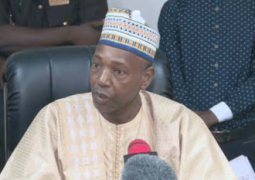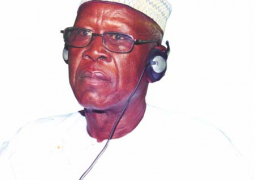On 16 March the British Prime Minister, Gordon Brown, hosted a meeting in Lancaster House for African leaders to discuss the global economic crisis and sought their views on solutions to feed into the G20 London Summit in April. The meeting was attended by, among others, President Kikwete of Tanzania, President Johnson-Sirleaf of Liberia, President Khama of Botswana, Prime Minister Meles of Ethiopia and Prime Minister Odinga of Kenya. Secretary of State for International Development Douglas Alexander and Minister for Africa in the Foreign and Commonwealth Office, Mark Malloch-Brown, also attended.
Before the meeting Malloch-Brown, DFID Parliamentary Under Secretary of State Ivan Lewis and Financial Secretary to the Treasury Stephen Timms, hosted a lunch for the attendees. Many of the points raised at the lunch were later presented at the meeting.
Below is the full text of Prime Minister Gordon Brown's opening remarks.
'Can I first of all welcome you all to London. This is one of the most important meetings we will have. The world economy is in a recession that is affecting every continent and affecting, as you know, every country, and it is our duty to do everything that we can, first of all, to relieve the pressure that people are facing as a result of the downturn, and Africa knows more about these problems than any continent in the world; and secondly, to prepare ourselves to get out of the downturn by taking the right decisions for the future.
Now that is why I am so pleased that President Kikwete, President Khama, President Johnson-Sirleaf, Prime Minister Odinga and Prime Minister Meles Zenawi are all here with us today and I am very pleased that Trevor (Manuel), as Head of the Group of the Finance Ministers that has been involved in making proposals to us, is also here.
And I want us to come out of this meeting today with not only a determination that every continent, and that means Africa, has its fair share of support over the next few months, but equally every continent feels that it can play a part in drawing up the plan for recovery.
There will be of course representatives at the G20. I know that your preference is also for reform of the international system and I agree with you that big changes need to be made in the representation and the quotas and the allocations for individual countries and individual continents, and I believe that that wish will come out of the G20 meeting.
Now in dealing with this global crisis, the first thing that we have got to do is to make sure that where we can we protect people against the impact of this crisis. And Douglas Alexander has announced that we will make our contribution to a World Bank Social Protection Fund, and we are calling on all countries to make such a contribution. There is a need for a safety net against the vulnerabilities that people face. We know that 100 million more people are being forced into poverty, we know that half a million children a year could die as a result of the absence of healthcare because of the deterioration of the finances of families. So that is the first thing - we have got to protect people, and provide real help now for people in difficulty.
The second thing is that we have got to make sure that every continent has the ability to protect itself against the banking failures that have happened. A situation that started in America and spread to the rest of the world is now affecting the poorest countries most, and we want the different international institutions to be in a position to support whatever restructuring of the financial system is necessary, and to support the funds flowing again to businesses to invest.
And that leads on to the third point - and that is trade. We know that there is an interruption in trade taking place. We know that this will be the first year of 30 years that trade has actually fallen, and we know that the impact of that is mostly on the poorest countries. So we have to find a way in which we can stop protectionism, encourage people to sign up to Doha - which has of course the effect of releasing about four billion of extra resources for infrastructure and other support for development - and monitor what is happening. If other countries are adopting protectionist policies we will know about it and the world is in a position to take action. But perhaps most of all we have to make available trade credits to enable trade to flow round the world and enable Europe to trade with each other and others to trade with you. And this is one of the main aspects of policies that we need to discuss at the G20 and your views on this would be most welcome.
And then to the international institutions themselves, I have said that they need to reform in terms of their representation. I think that they also need to be in a position to provide the resources with less conditionality than we have had in the past. I want the International Monetary Fund to have available a crisis facility, but it will need to be properly resourced. I want the Monetary Fund also to be able to set up a preventative facility to prevent the damage that could be done if banks fail and if countries are put in a difficult position because of that. We want the World Bank to be in a position to deliver more resources for infrastructure, not as a promise, but in detail this year, as a result of advancing their programmes, and I have talked to President Zoellick of the World Bank about what he can do in this respect. We want the World Bank to be in a position to sponsor - with other countries, export credit agencies and the private sector - billions of pounds of trade credits that would enable the flow of trade around the world.
So for the outcome of this G20 meeting we want there to be immediate action, the medium term reforms that are necessary for our financial system And we want, finally, the big reforms to take place in the International Monetary Fund and the World Bank that were set up in the 1940s that do not meet all the needs that we have in 2009. And when we set up a preventative facility to enable people to draw on it, I want it to be without the conditionality that normally attaches to International Monetary Fund programmes.
I think you can look on this as one of the problems that this globalizing world has got to deal with. We have problems of climate change. We have problems of great inequalities between nations. We have problems of security arising from the mobility of people and obviously the insecurity that arises when groups who are violent try to take part. We have also the problem of financial instability.
If we can solve these four big problems of globalization, then we are able to say that the global economy could start to work in the interests of all those who depend upon it, and we are on the way to building a global society where people can work together for the future.
So the challenge is big. It is not simply about getting out of this financial crisis; it is about building a global economy that is a force for justice on a global scale. I believe that we would be true to the Millennium Development Goals only if we see that solving the present financial crisis is part of building a world that is more equal and more fair and not using the crisis to delay that, but actually seeing the crisis as a means by which we have to move quickly, more quickly indeed, to bring that about.



